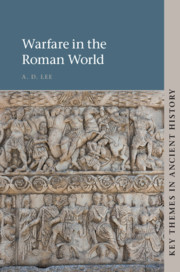Refine search
Actions for selected content:
23990 results in Ancient history
Introduction
-
- Book:
- Cicero's Political Personae
- Published online:
- 31 August 2020
- Print publication:
- 10 September 2020, pp 1-25
-
- Chapter
- Export citation
Chapter 4 - The Orator without Authority
-
- Book:
- Cicero's Political Personae
- Published online:
- 31 August 2020
- Print publication:
- 10 September 2020, pp 103-128
-
- Chapter
- Export citation
Chapter 6 - The Popular Orator
-
- Book:
- Cicero's Political Personae
- Published online:
- 31 August 2020
- Print publication:
- 10 September 2020, pp 154-176
-
- Chapter
- Export citation
Acknowledgments
-
- Book:
- Cicero's Political Personae
- Published online:
- 31 August 2020
- Print publication:
- 10 September 2020, pp ix-x
-
- Chapter
- Export citation
Conclusion
-
- Book:
- Cicero's Political Personae
- Published online:
- 31 August 2020
- Print publication:
- 10 September 2020, pp 223-227
-
- Chapter
- Export citation

Warfare in the Roman World
-
- Published online:
- 04 September 2020
- Print publication:
- 17 September 2020
Chapter 4 - The Education of Callias in the Symposium
-
- Book:
- Xenophon and the Athenian Democracy
- Published online:
- 28 August 2020
- Print publication:
- 03 September 2020, pp 102-125
-
- Chapter
- Export citation
Index
-
- Book:
- The Tabula Lugdunensis
- Published online:
- 13 August 2020
- Print publication:
- 03 September 2020, pp 196-206
-
- Chapter
- Export citation
Appendix 2 - Appendices
- from 1 - Many Ancient Greek Occupations, but Few Professions
-
- Book:
- Skilled Labour and Professionalism in Ancient Greece and Rome
- Published online:
- 18 September 2020
- Print publication:
- 03 September 2020, pp 57-57
-
- Chapter
- Export citation
9 - The Profession of Mousikē in Classical Greece
- from Part IV - Case Studies of Professions 2: Music and Athletics
-
-
- Book:
- Skilled Labour and Professionalism in Ancient Greece and Rome
- Published online:
- 18 September 2020
- Print publication:
- 03 September 2020, pp 269-292
-
- Chapter
- Export citation
Chapter 2 - Politics and the Gentleman in the Memorabilia
-
- Book:
- Xenophon and the Athenian Democracy
- Published online:
- 28 August 2020
- Print publication:
- 03 September 2020, pp 37-71
-
- Chapter
- Export citation
11 - Ports, Trade and Supply Routes in WesternEurope
-
-
- Book:
- Roman Port Societies
- Published online:
- 30 October 2020
- Print publication:
- 03 September 2020, pp 241-265
-
- Chapter
- Export citation
Introduction
-
-
- Book:
- Skilled Labour and Professionalism in Ancient Greece and Rome
- Published online:
- 18 September 2020
- Print publication:
- 03 September 2020, pp 1-26
-
- Chapter
- Export citation
List of illustrations
-
- Book:
- The Tabula Lugdunensis
- Published online:
- 13 August 2020
- Print publication:
- 03 September 2020, pp vii-viii
-
- Chapter
- Export citation
Dedication
-
- Book:
- Xenophon and the Athenian Democracy
- Published online:
- 28 August 2020
- Print publication:
- 03 September 2020, pp v-vi
-
- Chapter
- Export citation
16 - Reading Roman Port Societies
-
-
- Book:
- Roman Port Societies
- Published online:
- 30 October 2020
- Print publication:
- 03 September 2020, pp 425-443
-
- Chapter
- Export citation
12 - Professionalism, Specialization, and Skill in the Classical Spartan Army?
- from Part V - Case Studies of Professions 3: A Profession of Arms?
-
-
- Book:
- Skilled Labour and Professionalism in Ancient Greece and Rome
- Published online:
- 18 September 2020
- Print publication:
- 03 September 2020, pp 335-361
-
- Chapter
- Export citation
Appendix
- from 3 - Stationes and Associations of Merchants at Puteoli and Delos
-
- Book:
- Roman Port Societies
- Published online:
- 30 October 2020
- Print publication:
- 03 September 2020, pp 82-84
-
- Chapter
- Export citation
General Index
-
- Book:
- Xenophon and the Athenian Democracy
- Published online:
- 28 August 2020
- Print publication:
- 03 September 2020, pp 212-216
-
- Chapter
- Export citation
8 - The Imperial Cult and the Sacred Bonds of RomanOverseas Commerce
-
-
- Book:
- Roman Port Societies
- Published online:
- 30 October 2020
- Print publication:
- 03 September 2020, pp 178-197
-
- Chapter
- Export citation
